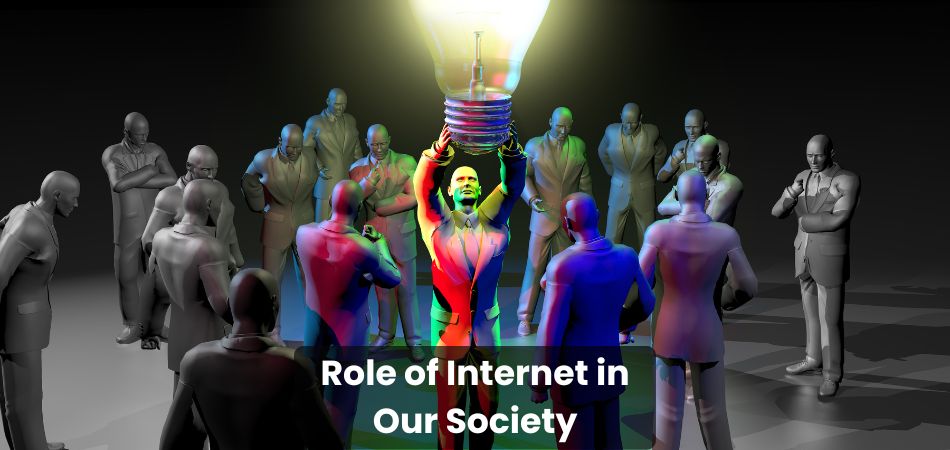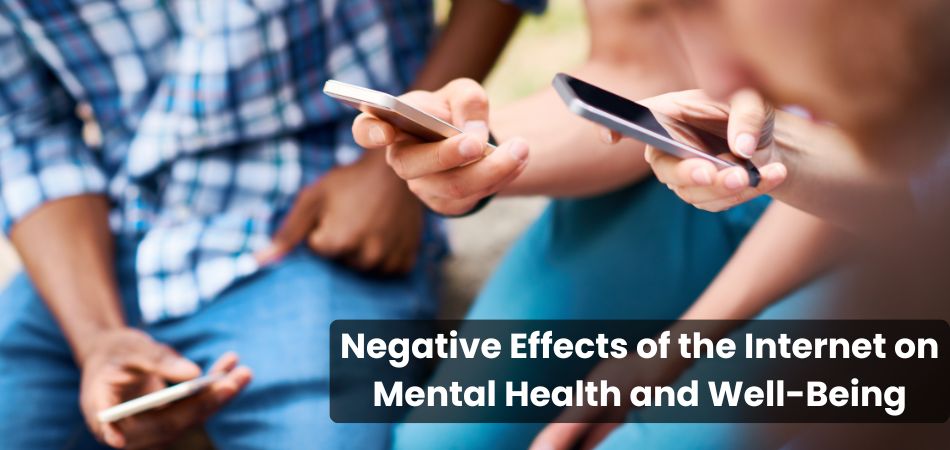The internet has transformed the way we live, work, and connect with one another. From instant communication to limitless access to information, its impact on daily life is undeniable. However, this dramatic evolution has caused a crucial debate: Has the internet made society better?
Yes, the internet has made society better by improving access to information, creating global connections, and driving innovation. However, its benefits come with challenges like misinformation and privacy concerns that require careful management.
This blog explores the multifaceted effects of the internet, weighing its contributions against its challenges. Join us as we examine whether this digital revolution truly uplifts society or presents new obstacles for humanity to navigate.
Role of Internet in Our Society
The internet has become an integral part of our modern lives, influencing how we work, shop, and entertain ourselves. It serves as a bridge, connecting individuals and businesses across borders, enabling smooth collaboration and global trade. This digital ecosystem is redefining traditional industries, providing opportunities for growth and innovation.

Beyond its economic impact, the internet has transformed cultural expression. Artists, writers, and filmmakers now have platforms to share their creations with a worldwide audience. It has democratized access to art and culture, allowing diverse voices to be heard and celebrated in ways never imagined before.
The internet also plays a critical role in environmental sustainability. From promoting digital alternatives to physical goods to enabling smart technologies that conserve resources, it supports the global push for eco-friendly practices. As society continues to evolve, the internet remains a powerful tool for shaping a more connected, inclusive, and sustainable future.
Key Roles of the Internet:
- Drives global economic growth through digital innovation.
- Democratizes cultural access, amplifying diverse voices.
- Facilitates eco-friendly practices with digital solutions.
- Enhances global collaboration across industries and communities.
- Revolutionizes how society consumes and creates content.
Does the Internet Strengthen or Weaken Social Connections?
The internet has redefined the way we form and maintain social connections, bridging distances that once limited human interaction. Virtual platforms enable people to connect instantly, promoting friendships, relationships, and communities that transcend geographical barriers. For many, this accessibility strengthens social ties by creating opportunities to interact with like-minded individuals.
However, the internet’s role in social connections is not without challenges. Critics argue that digital communication often lacks the depth and authenticity of face-to-face interactions. Over-reliance on virtual platforms can lead to superficial connections, making it harder to nurture meaningful relationships. In some cases, excessive internet use can even contribute to social isolation and a diminished sense of belonging.
Despite these concerns, the internet has created spaces for niche communities and support groups that might not exist offline. It offers a platform for individuals to share experiences, find solidarity, and engage in collective action. The greatest impact depends on how we balance online and offline interactions.
Has the Internet Made Society Better?
The internet has fundamentally reshaped society, influencing every aspect of our lives. From how we communicate and work to how we learn and entertain ourselves, its impact is profound. While many celebrate its ability to connect people and democratize access to knowledge, others raise concerns about its potential harms.

Issues like misinformation, privacy breaches, and digital addiction highlight the complexities of this global tool. The question remains: has the internet made society better overall? Below, we explore this question through various lenses to understand its multifaceted impact on humanity.
Empower Global Communication
The internet has transformed global communication, making instant interaction possible regardless of distance. It enables families, friends, and colleagues to stay connected through video calls, messaging apps, and social media. Businesses now rely on internet tools to collaborate across time zones, enhancing efficiency and productivity. However, the ease of communication also brings challenges, such as cyberbullying and digital fatigue.
Revolutionizing Education and Learning
Online resources and platforms have democratized education, providing access to information for people worldwide. The rise of e-learning tools has made it possible for students in remote areas to access quality education. Additionally, the internet offers endless self-improvement opportunities through tutorials, courses, and webinars. Yet, the digital divide remains a barrier, leaving millions without access to these benefits.
Support Economic Growth and Innovation
The internet fuels economic growth by enabling businesses to reach global markets and streamline operations. E-commerce platforms have created opportunities for entrepreneurs and small businesses to thrive. Moreover, the internet has accelerated technological innovation in healthcare, finance, and other industries. Despite these advantages, concerns about job automation and cybersecurity persist.
Better Social Activism and Awareness
The internet has amplified the voices of marginalized communities, encouraging global awareness of critical social issues. Platforms like social media serve as hubs for activism, uniting people around causes and driving meaningful change. Movements such as #MeToo and climate action campaigns demonstrate the internet’s power to mobilize individuals. However, online activism can sometimes devolve into performative allyship or misinformation spreading.
Challenges to Privacy and Mental Well-Being
While the internet offers convenience and connectivity, it raises concerns about data privacy and security. Many users are unaware of how their personal information is collected and used by companies. Additionally, excessive internet use has been linked to mental health issues like anxiety and depression. Striking a balance between online engagement and well-being is essential for society to thrive.
How Has the Internet Influenced Mental Health and Social Interaction?
The internet has become a double-edged sword in shaping mental health and social behavior. It offers opportunities for connection and support but also presents risks that can affect emotional well-being. By exploring its nuanced effects, we can better understand how to navigate the digital world in a balanced way.
Rise of Online Support Communities
Online forums and support groups provide a space for individuals to share their struggles and seek advice. These communities help people find solace and build networks with others facing similar challenges. However, they can sometimes reinforce unhealthy behaviors if not moderated effectively.
Impact of Screen Time on Emotional Health
Prolonged screen time is linked to issues like stress, disrupted sleep, and reduced emotional resilience. While some digital interactions inspire positivity, excessive exposure to negative content can amplify stress. This underscores the importance of mindful internet use to maintain mental balance.
Emerging Social Skills in the Digital Age
The internet has created new norms for communication, influencing how we interact in person. Digital tools allow for fast exchanges but can hinder the development of deep conversational skills. Balancing online and offline interactions is crucial for developing meaningful relationships.
Exposure to Triggering Content
The internet’s vast content can be both enlightening and harmful, exposing users to triggering material. While some platforms offer tools to manage content exposure, their algorithms often prioritize engagement over safety. This makes self-regulation vital for emotional well-being in the digital space.
Role of Virtual Relationships
Virtual friendships and relationships provide a sense of belonging, especially for those who struggle with in-person connections. However, the lack of physical cues in online interactions can sometimes lead to misunderstandings. Building authentic relationships requires a thoughtful approach to virtual engagement.
Negative Effects of the Internet on Mental Health and Well-Being
While the internet has revolutionized access to information and connectivity, it also poses significant risks to mental health and overall well-being. Its pervasive influence can lead to emotional stress, social challenges, and unhealthy behaviors. These are some negative effects of the Internet on mental health and well-being:

- Increased Anxiety from Constant Connectivity: The pressure to be always available online can lead to feelings of overwhelm and anxiety. Notifications and endless updates disrupt focus and contribute to mental exhaustion.
- Cyberbullying and Emotional Distress: Online harassment exposes individuals to negative comments and harmful interactions. This can damage self-esteem and lead to long-lasting psychological effects.
- Addiction to Digital Platforms: Excessive use of social media and gaming platforms supports addictive behaviors. Over time, this can interfere with daily responsibilities and relationships.
- Comparisons Leading to Low Self-Worth: Constant exposure to curated lives on social media can create feelings of inadequacy. This cycle of comparison often impacts self-confidence and happiness.
- Disrupted Sleep Patterns: Excessive screen time, especially before bed, interferes with the body’s natural sleep cycle. Poor sleep quality is closely linked to increased stress and lower mental resilience.
- Overexposure to Negative News: The internet amplifies access to distressing news, triggering emotional responses like fear or hopelessness. This constant bombardment can take a toll on mental health over time.
FAQs About the Internet’s Impact on Society
The internet has become a cornerstone of modern life, but its effects on society continue to raise questions and encourage debates. From how it influences relationships to its role in creating global trends, the internet’s impact is vast and complex. Here are some frequently asked questions to explore these issues further.
1. How Does the Internet Affect Productivity?
The internet boosts productivity by providing instant access to information and efficient communication tools. However, distractions like social media and constant notifications can hinder focus. Balancing internet use with mindful habits is crucial for maximizing productivity.
2. Is the Internet Making Us More Informed?
The internet offers access to a wealth of knowledge, empowering individuals to learn and grow. However, the spread of misinformation can distort understanding and decision-making. Verifying sources and practicing critical thinking are essential in navigating online content.
3. Can the Internet Replace Traditional Education?
The internet complements traditional education by offering diverse learning resources and flexibility. However, it lacks the interpersonal and hands-on experiences that physical classrooms provide. A blended approach can integrate the strengths of both methods for optimal learning.
4. Does the Internet Strengthen Global Unity?
The internet connects people across the world, enabling cultural exchange and collaboration. However, it also amplifies divisions through echo chambers and polarized discourse. Promoting digital literacy and respectful dialogue can enhance its unifying potential.
5. How Does the Internet Impact Creativity?
The internet provides platforms for creators to share their work and gain inspiration. Yet, it also supports a culture of imitation and pressure to conform to trends. Balancing innovation with authenticity helps individuals thrive in the digital creative landscape.
Final Notes
The internet has profoundly transformed society, offering the greatest opportunities for connection, education, and innovation. It has empowered individuals and communities, but it has also introduced challenges like misinformation, privacy concerns, and social disconnection.
The question “has the internet made society better” does not have a simple answer, as its impact varies based on how it is used. By expanding digital literacy, promoting ethical practices, and finding balance in our online and offline lives, we can harness its potential for good. So, the internet’s value lies in how we adapt it to meet society’s evolving needs responsibly and thoughtfully.
